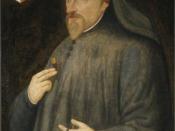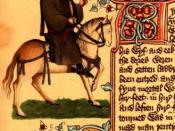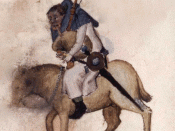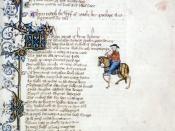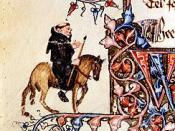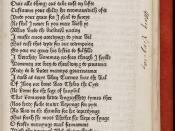In The Canterbury Tales Chaucer relates two stories; "The Miller's Tale" and "The Reeve's Tale." They are two stories that portray what love means to the Miller and the Reeve. Their perceptions of love and women are very similar, but the women act differently from one another. The men in the tales fall in love with the women's beauty, but the women respond differently to their actions. The Miller and the Reeve through their stories try to irritate and embarrass one another but in varying forms of humiliation. Also both of their stories show strong evidence of poetic justice towards different offenders.
Love to both the Miller and the Reeve is frequently associated with beauty, lust, and sex. There vision of love is consistent in both stories; they care mostly about the women's figure. This can be seen in both stories by the way that the women are described.
Both of the story tellers do not offer much insight into the women's intelligence or mental characteristics. This can be seen in "The Miller's Tale" when the Miller writes, "She was a fair young wife, her body was slender" (90), and in "The Reeve's Tale" when the Reeve writes, "Her rump was broad, her breasts were round and high" (110). The two stories contrast in how the women act towards the men. The Miller describes Alison as having, "a lecherous eye" (90). In contrast the Reeve refers to Molly as, "the parson of the town" (110). These traits would show why Alison would be more likely to be aggressive to get what she wants than Molly.
The men in "The Miller's Tale" and "The Reeve's Tale" both feel a strong initial attraction to the women, but both women respond differently to the unrestrained remarks. Nicholas initially grabs Alison saying, "Unless I have my will of you, I'll die of secret love" (91). Alison initially responds to this by threatening to yell, but eventually gives in to his demands. The clerks on the other hand seem to deal with women that are more accepting. Alan, in his conquest for Molly, finds her to be very accepting. This is shown when the Reeve writes, "And ere she saw him, he had drawn so nigh it was too late for her to give a cry" (115). When John tricks the miller's wife she does not hesitate and describes it as, "It was the merriest fit in all her life" (116).
The Miller and the Reeve through their tales are trying to embarrass each other. Their stories include an unlucky character who takes on the other's occupation. The Reeve becomes angry when the Miller first presents his story which might suggest that the tale is in fact about the Reeve. His reaction to the Miller's story is shown when he says, "It is a sin and foolishness to slander any man or bring a scandal on wives in general" (87). The Reeve's generalization makes sure that there is no evidence to point the story towards him. The Reeve dislikes the Miller's story and recites a story about a miller to rebuttal him. This offense towards the Miller becomes prevalent when the Reeve says, "I'll pay him back before I've done" (108). I think that out of the two stories, the Reeve offends the carpenter more than the Miller offends him because he had more things violated than the Miller. The Carpenter only becomes embarrassed and he becomes a cuckold, while the miller is stolen from, has his wife and daughter violated, and is knocked unconscious. The beating of the miller is shown when the Reeve says, "The clerks then beat him well and left him lying" (118)The tales of the Miller and the Reeve show very good examples of poetic justice. While both stories show poetic justice, the examples are very different. In "The Miller's Tale" Nicholas receives a hot poker iron to the backside because he tried to pull a prank on a harmless Absolam, and tricked the carpenter into separating himself from his wife so that Nicholas could sleep with Alison. Nicholas tricks the carpenter when he says, "You and your wife must hang some way apart, for there must be no sin before we start" (99). In "The Reeve's Tale" the miller receives justice for stealing flour from people and giving them other grains. Molly, his daughter, and his wife sleep with the Clerics and he is accidently beaten over the head and knocked unconscious by his wife.
In "The Miller's Tale" and "The Reeve's tale" Chaucer retells two stories that show what love means to the authors. While their ideas about women are very similar, the women they seek have very different responses to the men's actions. The men in the stories both fall in love with the women, and have their way with them differently. The stories both show that the Miller and the Reeve have an ongoing hatred for one another. There is also many varying forms of poetic justice.
The Canterbury Tales-Geoffrey Chaucer
